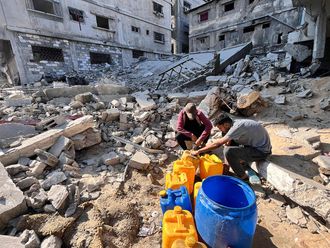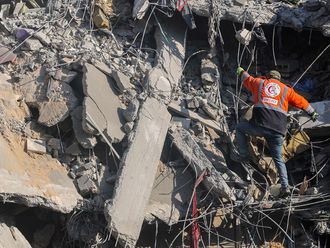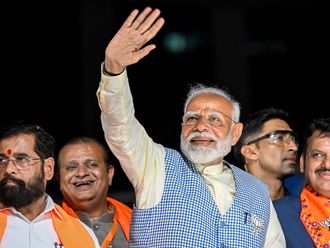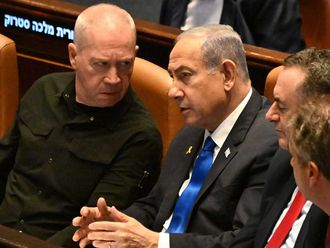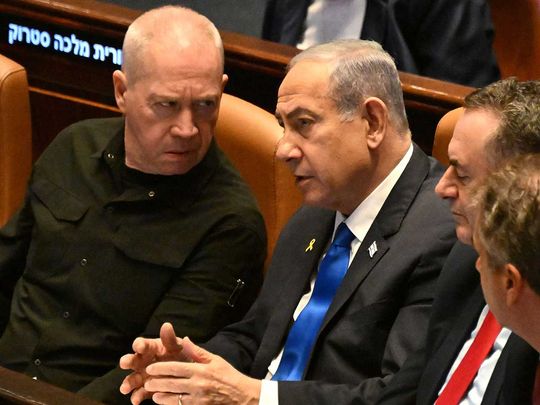
In a historic and consequential move, the International Criminal Court (ICC) has issued arrest warrants for Israeli Prime Minister Benjamin Netanyahu, former Defense Minister Yoav Gallant, and Hamas leader Ibrahim Al-Masri (Deif) for alleged war crimes and crimes against humanity.
While Israel and the United States reject the ICC's authority, countries bound by the Rome Statute—124 states across six continents—are legally obligated to enforce the warrants.
European Union member states such as France and Ireland have indicated they will honour the ICC's decision, potentially restricting Netanyahu and Gallant's ability to travel to these regions.
On the other hand, Deif remains underground, as he has been on Israel’s "most wanted" list for almost three decades, and the United States has declared him an international terrorist since 2015.
The ICC's decision, particularly regarding Netanyahu and Gallant, marks a watershed moment in the pursuit of global justice, holding leaders accountable for egregious violations of international law. This step is not only a victory for the victims of the Gaza conflict but also sets a vital precedent for deterring future atrocities worldwide.
Part of a deliberate strategy
The ICC’s ruling stems from a long-standing investigation into crimes committed in the State of Palestine, including Gaza. Netanyahu and Gallant face charges of using starvation as a method of warfare, targeting civilian populations, and depriving Gazans of essential resources like food, water, and medical supplies.
These actions, the ICC judges found, were part of a deliberate strategy to create conditions of life calculated to destroy a part of the civilian population. This decision challenges the perception that leaders of democratic or powerful nations are above the law, setting a precedent that even the most influential figures can be held accountable for their actions.
The ICC’s authority to prosecute crimes in Palestine is rooted in Palestine’s accession to the Rome Statute in 2015. Despite Israel’s repeated attempts to dispute the court’s jurisdiction, the ICC reaffirmed its mandate.
Israel’s claims that it was not properly notified or that the court lacked authority over Israeli nationals were unequivocally rejected, with the ICC emphasizing that international law applies to all states equally, regardless of their consent.
This clarity is essential. Too often, international legal mechanisms are undermined by political pressures and selective application. By rejecting Israel’s challenges and proceeding with arrest warrants, the ICC reinforces its commitment to impartiality and justice.
The ICC’s decision to issue warrants for Netanyahu and Gallant also represents an unprecedented moment in international justice. It is the first time that leaders of a democratic, Western-aligned state face charges before the court. This challenges the traditional double standards in international law, where leaders of smaller or less powerful states are often prosecuted while those of influential nations evade accountability.
A powerful message
Netanyahu’s government, backed by powerful allies like the United States, has long relied on diplomatic support to shield itself from legal scrutiny. By issuing these warrants, the ICC sends a powerful message: no leader, regardless of their country’s political alliances or status, is above international law.
The charges against Netanyahu and Gallant are deeply rooted in the humanitarian crisis in Gaza for more than a year now. The ICC found that the deliberate blockade and restrictions on essential supplies led to widespread suffering and death among civilians, particularly children.
Hospitals operated without basic medical supplies, surgeries were conducted without anesthesia, and access to food and clean water was severely limited. These actions not only violated international humanitarian law but also inflicted immense suffering on an already vulnerable population.
This indictment humanises the consequences of leadership decisions during war. It highlights the devastating impact of policies that prioritise military and political objectives over humanitarian considerations, holding leaders accountable for the lives lost and irreparable harm caused. The ICC decision aligns with the court’s broader efforts to prosecute war crimes, as seen in cases involving Sudan, Ukraine, and others.
Furthermore, this step serves as a deterrent for future leaders who might consider engaging in similar crimes. The knowledge that even the most powerful leaders can face prosecution may encourage greater adherence to international humanitarian law, reducing the likelihood of atrocities.
The ICC operates independently and is bound by rigorous standards of evidence and procedure. Accusations of bias are attempts to delegitimise a process that seeks accountability for crimes universally condemned by international law.
The court’s actions are not anti-Israel or anti-Semitic; they are pro-justice. They represent a commitment to holding all parties, including Hamas, accountable for violations. Such even-handedness is crucial for rebuilding trust in international legal institutions.
Right to accountability
For victims of the Gaza conflict, the ICC’s decision offers a glimmer of hope. Survivors and human rights organisations have welcomed the move as a long-overdue step toward justice.
It acknowledges the suffering endured by countless civilians and affirms their right to accountability and redress. This decision also restores faith in the principle that no one is above the law.
The ICC’s arrest warrants for Netanyahu and Gallant mark a significant victory for international justice and accountability. They challenge entrenched norms that shield powerful leaders from prosecution and reaffirm the universality of international humanitarian law.
While enforcement remains a challenge, this decision sets a vital precedent for deterring future crimes and ensuring that justice prevails, no matter how long it takes.



